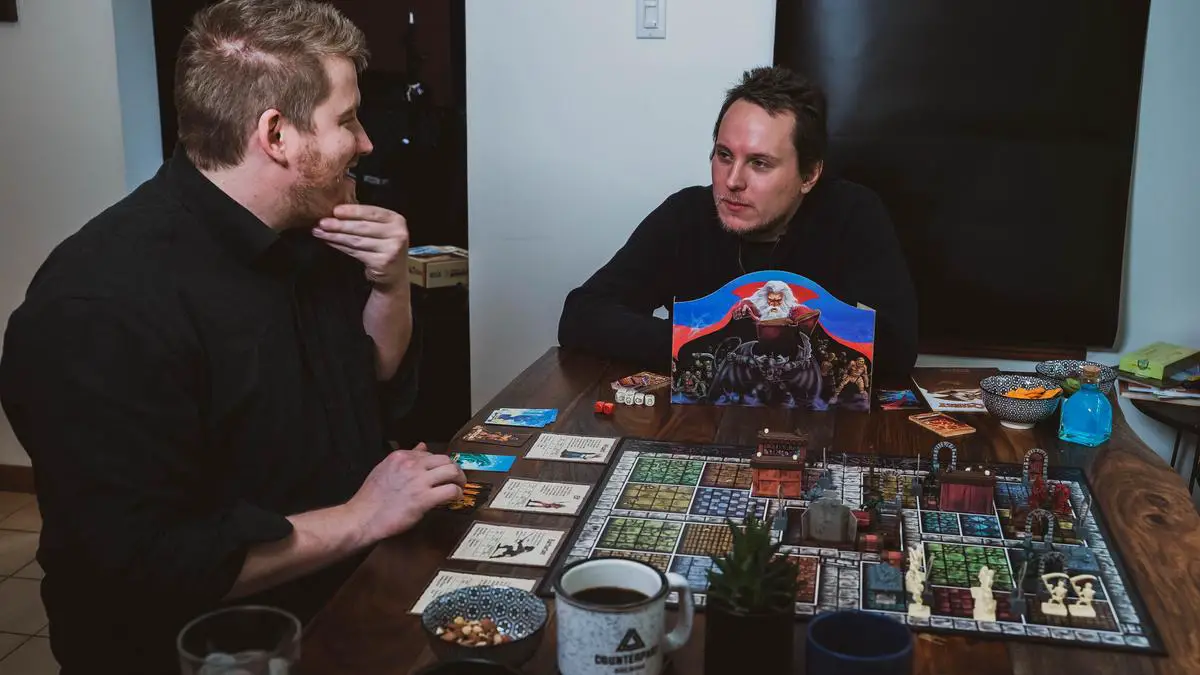Imagine gathering with friends or family, enjoying a night of laughter, competition, and camaraderie as you explore the world of board games together. Board game nights offer a unique and engaging way to build connections, spark creativity, and simply have a fantastic time. This comprehensive guide will help you create the perfect board game night, from selecting the ideal types of games and creating a diverse guest list to crafting a comfortable game space and serving delectable snacks and drinks. Get ready to embark on a fun-filled journey as you delve into the exciting realm of board game nights!
Types of Board Games
Strategy Board Games
Strategy board games are a popular genre for board game nights, as they challenge players to think critically and plan their moves in order to achieve victory. These games often involve resource management, area control, or other strategic elements, where players must make meaningful decisions that will impact their chances of winning. Well-known examples of strategy games include “Settlers of Catan,” where players compete to develop the most prosperous settlement, and “Risk,” where players seek to conquer the world through military strategy. Strategy games can vary greatly in complexity, with some being suitable for novices and others appealing to experienced gamers. Player counts for strategy games also vary, with some games designed for two players, while others can accommodate larger groups.
Trivia Board Games
Trivia board games are another common genre for an entertaining board game night. These games test players’ knowledge on a wide range of topics, from history and science to pop culture and sports. In trivia games, players typically advance on the game board by answering questions correctly or by performing various tasks related to the trivia theme. Popular examples include “Trivial Pursuit,” where players answer questions in a variety of categories to collect pie wedges, and “Wits & Wagers,” where players make bets on the answers to questions. Trivia games are often suitable for a wide range of age groups and can accommodate various player counts, making them a popular choice for social gatherings.
Party Board Games
Party board games are designed for larger gatherings and typically prioritize fun and laughter over strategy or competition. These games often involve players acting, drawing, or otherwise communicating with their teammates to achieve a goal. One popular example is “Pictionary,” where players must quickly sketch images to convey a word or phrase to their team. Another well-known party game is “Codenames,” which challenges players to communicate a series of code words to their team using only one-word clues. Party games usually accommodate a higher player count, making them ideal for larger groups looking for a casual and entertaining experience.
Role-Playing Board Games
Role-playing board games provide an excellent opportunity for players to assume the roles of various characters and embark on thrilling adventures, often within imaginative fantasy or sci-fi settings. These games typically involve cooperative gameplay, where players collaborate as a team to complete quests, tackle challenges, and achieve a shared goal. Renowned examples of role-playing board games include “Dungeons & Dragons,” in which players create their own characters and set off on elaborate adventures guided by a Dungeon Master, and “Gloomhaven,” a strategic cooperative game that lets players take on the roles of mercenaries exploring a dark and perilous world. The complexity of role-playing games can vary, with some boasting more intricate rules and mechanics, while others cater to a simpler, more accessible experience for newcomers. Additionally, the player count for role-playing games can differ, with some needing a minimum number of players, and others offering more flexibility in group size.

Creating the Guest List
Planning a Successful Board Game Night
Taking the excitement of role-playing board games into account, it’s essential to plan a successful board game night that caters to both experienced and new gamers. One of the most crucial aspects to consider is crafting an appropriate guest list. The people you invite will significantly influence the overall atmosphere and enjoyment of the evening. While selecting attendees, keep in mind factors such as the players’ experience levels, interests, and interpersonal relationships. This will help create a harmonious and enjoyable gaming environment for everyone involved.
Experience Levels
One crucial factor to consider is players’ experience levels when it comes to board games. You want to ensure that all guests feel comfortable and welcomed, no matter their familiarity with the games being played. If you have a mix of newcomers and seasoned board game players, consider allocating time to provide a brief tutorial of the game’s rules and strategies. Pairing inexperienced players with more knowledgeable veterans can also create a supportive environment, making the night more enjoyable and engaging for everyone involved.
Interests
Interests play a significant role in creating a successful board game night. Take the time to survey potential guests about their game preferences and try to choose a variety of games that cater to these tastes. Having a diverse selection of board games will help keep the evening fresh and entertaining. Some guests may enjoy strategic games, while others may prefer cooperative or party-style games. Make sure to listen to everyone’s interests and plan a game night that includes a mix of categories and genres.
Interpersonal Dynamics
The interpersonal dynamics among guests can make or break a board game night. When creating your guest list, consider how well your attendees get along with each other and avoid inviting individuals with clashing personalities. If some guests are less familiar with others in attendance, consider using icebreaker activities or conversation-starters to help people feel at ease and create a relaxed environment for the evening. Board game nights can foster strong connections through teamwork, competition, and shared experiences. Ensuring the right interpersonal dynamics will help lead to a successful game night and lasting memories.
Guest List Size
One of the key aspects to consider when planning a board game night is the size of your guest list. The number of guests you invite will greatly affect the overall atmosphere and enjoyment of the evening as it depends on the available games and the space provided. A smaller gathering of close friends may encourage deeper connections and more engaged gameplay, while a larger group might require multiple games happening at once to cater to everyone’s interests. Don’t hesitate to get creative and use your guest list to craft the perfect board game night experience for all participants.

Setting Up the Game Space
A Comfortable and Functional Board Game Playing Environment
Another major factor in enhancing the overall experience of board game night is creating a comfortable and functional environment. A suitable table size is essential for a successful gaming experience, as it ensures all players have enough space to maneuver and prevents overcrowding. Ideally, the table should accommodate the board, game pieces, and any additional items such as cards or scorekeeping materials, while still providing ample room for everyone to sit comfortably. For larger games or more extensive board game collections, consider using a modular table or even setting up multiple gaming tables to fit everyone’s needs.
Seating
is another important consideration when setting up a game space, as player comfort plays a significant role in ensuring a fun and enjoyable game night. Seats should provide ample back support and be the right height for the table, allowing players to focus on the game instead of shifting positions to alleviate discomfort. Additionally, if the game night will last for several hours, it’s crucial to provide enough seating for all players, so they can take breaks and relax between games. Providing a variety of seating options such as chairs, couches, or floor cushions allows players to choose their preferred seating option.
Lighting
is a vital aspect of setting up a successful board game space, as it can significantly impact players’ ability to see and decipher game components clearly. Proper lighting can elevate the gaming experience and reduce eye strain during long sessions. Overhead lighting can create glare on game boards or cards, but task lighting focused directly on the playing area can help mitigate this issue. If adjustable, lighting should be positioned to avoid shadows cast by players or game pieces, making it easier to view the board.
Game Space Selection
is also vital for ensuring a pleasant and inclusive experience for all. The chosen space should be large enough for players to move around easily, and accessible for all guests, including those with mobility or sensory limitations. Strategic placement of tables and seating arrangements can optimize the flow and movement throughout the area, making it easy for players to maneuver, socialize, or grab a snack without disrupting the game.
Setting the Stage for Board Game Night
The layout of your game space is crucial for fostering a welcoming and engaging environment during board game night. Organize games in a specific area or use a designated storage system to create an inviting atmosphere for players to easily choose their next game. Including decorations or themed elements related to board gaming or a specific game night theme can contribute to a fun and enjoyable experience for everyone. By considering these aspects when setting up your game space, you can create a functional and comfortable environment that enhances the overall board game night experience.

Game Night Snacks and Drinks
Food and Drink Considerations
As you plan your board game night, don’t forget the importance of having a variety of delicious snacks and drinks on hand to make the evening enjoyable for everyone. To accommodate your guests’ varying tastes and dietary preferences, offer a selection of both sweet and savory snacks. Low-mess and easy-to-eat options are particularly suitable for a game night, ensuring that guests can focus on enjoying the games while indulging in tasty treats.
Snacks
One of the simplest and most beloved game night snacks is fresh popcorn. It’s easy to prepare, and you can customize it with various flavorings such as salt, butter, or even cheese. For a healthier and allergy-friendly option, consider offering veggie sticks with different kinds of dips like hummus, guacamole, or ranch dressing. If you prefer to serve something more filling, cheese and charcuterie boards are an excellent crowd-pleaser. For those with a sweet tooth, a plate of cookies or brownies would be a popular choice.
Beverages
In addition to snacks, it’s crucial to provide an assortment of beverages for your guests. Non-alcoholic choices like water, soda, fruit juice, and iced tea are always safe bets. It is also a nice touch to have a selection of hot drinks available, such as coffee, tea, or hot chocolate, as some guests may prefer a warm beverage to help them relax and focus on their game strategy.
For those who prefer alcoholic beverages, having a small variety of beer, wine, and cocktail options available can enhance the overall game night experience. It’s wise to have a couple of popular beers on hand, such as light lagers or IPAs, as well as a red and white wine choice. If you’re feeling a bit more adventurous, you could mix up a simple cocktail like Moscow mules or margaritas. Remember to provide non-alcoholic beverage options even when serving alcohol, as some guests may prefer to alternate between the two.
Creating a Great Atmosphere
A successful board game night is built upon the foundation of a welcoming atmosphere, good company, and enjoyable games. Providing a varied selection of food and drinks will cater to different tastes and dietary preferences, ensuring everyone is satisfied and engaged throughout the event. It is important to remember that the heart of any board game night lies in the shared entertainment and camaraderie among friends.

Managing Game Rules and Difficulty Levels
Planning a Successful Board Game Night
After setting the stage with a comfortable environment, the next crucial step in planning a board game night is selecting the right games to play. The chosen games’ complexity should align with your guests’ familiarity with board games, their willingness to learn new rules, and the overall mood of the event. Striking the right balance between game complexity and accessibility will ensure that all participants have a fun and engaging experience.
Choosing the Right Complexity
To choose the right balance of complexity, begin by gauging your guests’ experience with board games. If you have a mix of seasoned gamers and novices, it’s best to pick games that have a low learning curve but still offer depth and strategy for more experienced players. If most guests are familiar with board games, consider introducing them to new games with more complex rules and mechanics, as long as the majority of the group is eager to learn something new. Conversely, if your guests are mostly casual gamers or entirely new to the hobby, stick to easy-to-understand games that won’t be too overwhelming or time-consuming. A classic like Ticket to Ride, may be a great place to start!
Effectively Explaining Game Rules
Another crucial aspect of managing game rules and difficulty levels is the ability to explain the rules effectively. A solid explanation can make or break the experience for your guests. Before your board game night, take some time to familiarize yourself with the rules of the games you’ve chosen. Be prepared to succinctly explain the objective of the game, how turns work, and the steps needed to win. During the night, present the rules patiently and clearly, using examples if necessary. Encourage questions and be ready to assist as guests begin to play. Avoid lengthy or convoluted explanations, as they may intimidate or bore your guests.
Consider the Mood
The overall mood of the night is another important factor in selecting games and managing their complexity. Consider what your guests are looking for in a board game night—some may want a fun, casual environment where conversation and laughter take precedence, while others may be seeking a more competitive, strategy-driven atmosphere. Be prepared with a variety of games to choose from, so you can switch gears if the mood shifts. Keep in mind that even serious gamers might appreciate a more laid-back game night from time to time.
Remaining Flexible
As a host, remaining flexible throughout the evening is crucial to ensuring a successful and enjoyable board game night for all. Be open to modifying the rules slightly if it will increase your guests’ satisfaction. For example, should a certain game take longer than expected or the group struggle with grasping the rules, consider implementing house rules to simplify gameplay or speed up the process. Ultimately, creating a fun, engaging experience for everyone involved should be your top priority, so be prepared to adjust on the fly as necessary.

Keeping the Night Fun and Engaging
A Key Element in Keeping a Board Game Night Fun and Engaging:
In addition to flexibility, creating a positive, competitive environment plays an essential role in maintaining an entertaining board game night. One way to achieve this is by selecting an appropriate mix of games that cater to all participants’ interests and skill levels. By offering a variety of choices, you encourage players to try new games and challenge themselves in a friendly, supportive atmosphere. Furthermore, setting aside time to effectively explain rules and provide helpful tips proves invaluable for a smooth gaming experience, as it minimizes frustrations caused by complicated game mechanics and keeps everyone engaged and entertained throughout the night.
To maintain the excitement and engagement during the games:
It is essential to establish fair and clear rules from the start. Should a situation arise where the game rules are unclear, consider consulting resources such as rulebooks or online forums to reach a well-informed resolution. Encourage players to communicate openly and respectfully about any disagreements during the game. By keeping the conversation honest and focused on finding solutions, you can avoid potential conflicts and keep the mood light and enjoyable.
When it comes to dealing with sore winners or losers:
Establishing a positive atmosphere that prioritizes fun and camaraderie is crucial. Remind players that winning or losing does not define their character and that the primary purpose of board game night is to have fun and bond with friends. Encourage good sportsmanship by setting an example through your behavior – always congratulating opponents on a well-played game and remaining humble in victory. This helps foster a supportive community where everyone feels welcomed and valued regardless of their gaming abilities.
In order to keep the event flowing smoothly:
It can be helpful to designate a specific person to act as the game master or moderator. This person’s role could include explaining rules, facilitating gameplay, keeping track of scores, and managing the game’s pace. By having someone in this unbiased position, it ensures that the board game night stays on track and maintains a fair playing environment for everyone involved.
Another helpful technique for keeping players interested and engaged during board game night:
is providing opportunities for players to socialize and bond outside of the gaming environment. Energetic, non-competitive games or fun icebreaker activities can help to provide a break from more intense games and create a sense of camaraderie among attendees. Additionally, offering snacks and refreshments can also contribute to a more relaxed and enjoyable atmosphere. By incorporating these practices into your board game night, you can create a positive, engaging environment that participants will look forward to attending time and time again.

As you can see, hosting a successful board game night involves careful planning, thoughtful consideration of guests and games, and attention to creating an enjoyable and welcoming atmosphere. Keep these tips in mind as you prepare for your next game night, and you’ll be on your way to creating an unforgettable evening filled with enjoyment and strong connections for everyone involved. So break out your favorite board games, gather your friends and family, and create lasting memories one roll, flip, or move at a time.